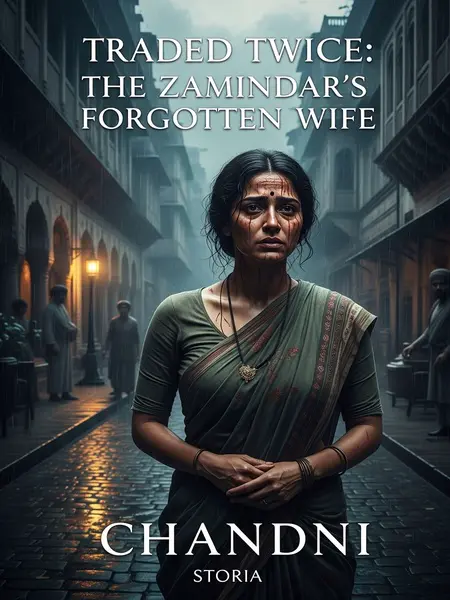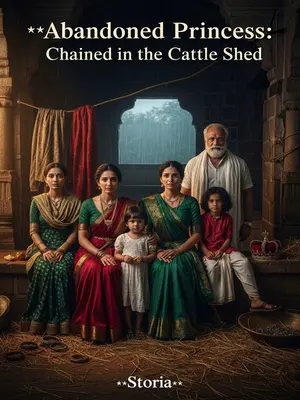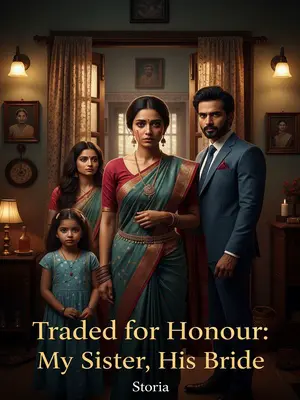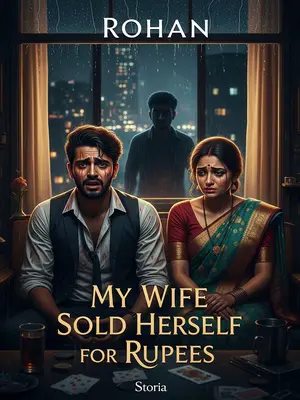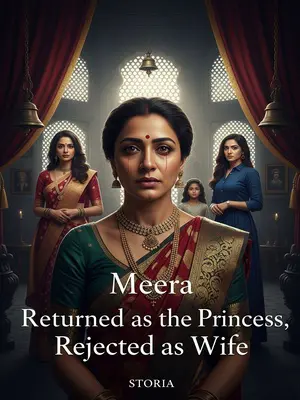Chapter 2: Ashes and Departure
When I left, I wore old glass bangles and a plain cotton saree, taking only a jewellery box with me.
My footsteps echoed through the empty corridor, the clack of my green glass bangles sounding forlorn in the silence. Outside, the milkman’s cycle bell rang, and a stray dog chased after a boy with a schoolbag. Inside, the only sound was the tick of the grandfather clock. No one came to see me off—not the servants who once rushed to fill my water pot, not even the old gardener who taught me the names of every flower. Only the jewellery box, the last relic of all I had endured and lost, pressed tightly to my chest, kept me company.
The future zamindar’s wife, Meera Sharma, sent her personal ayah ahead to inspect the wedding arrangements at the residence.
Meera Sharma’s ayah arrived like a storm in May—sharp eyes, starched white sari rustling with every movement, her presence stiff as an old sepia photograph. The cooks whispered about her strictness, the kitchen boys scattering to avoid her path.
The ayah stopped me in the drawing room.
She filled the space, arms crossed, expression unreadable. The heavy curtains were drawn, dust swirling in the slanted sunlight. Sweat trickled down my back, the ceiling fan doing little to cool my nerves.
Her eyes swept over the jewellery box in my hand.
Her gaze was clinical, lingering on my plain saree before settling on the box. I met her stare, refusing to lower my eyes, though my heart thudded in my chest.
"Everything in the heir’s residence is registered and accounted for. My madam’s dowry arrived three days ago. If anything is missing, this old servant will have trouble explaining herself."
Her words were clipped, rehearsed—a warning that not even a trinket would escape her notice. I remembered my mother’s words: never argue with the keeper of the keys.
I said nothing. Last night, Arjun tormented me one last time, leaving me hoarse and unable to speak.
The memories rushed in—his hands rough, his breath heavy with whisky. Afterwards, silence so thick it threatened to choke me. I tried to swallow my shame, but it clung to my throat, robbing me of words. I watched the ayah’s face, trying to appear composed, but I knew my eyes betrayed the storm inside.
He was relentless, as if it truly were the last time. When I fainted and woke again, he was still pinching my soft flesh.
His grip had been bruising, desperate—extracting a final proof of power. The moonlight slanted through the jali window, his face twisted in private agony. I clenched my teeth, tears mingling with sweat, counting seconds until it ended. When he finally left, I rubbed my bruised wrist, adjusting my pallu to cover the marks—trying to preserve whatever dignity I had left.
His voice was hoarse:
"Chandni, I’ve given you all I can... You may choose one thing from this room to take with you as your dowry."
He sounded almost tender, but the words fell like a verdict. I looked around at the opulence—mirrors, silk sarees, gold paayals. But my hand went to the jewellery box he had carved for me in those early days, before bitterness took root.
So today, I chose. I held the jewellery box he had crafted with his own hands.
There was a strange poetry in that choice—a final, silent claim to the memories and heartbreak he had given me. As I held it close, I felt the grain of the wood under my fingers, tracing the carvings I had admired so many years ago, when love had still seemed possible.
It was clear that Meera Sharma’s ayah was deliberately finding fault.
Her nostrils flared as she leaned closer, her tone sharp and cutting. "Aree, itna bada box? Aur keh rahi ho, kuch nahi le ja rahi? Aurat logon ka rona-dhona, bas takleef hi deta hai." She smirked, making sure everyone in the room heard her.
Yet he told me,
"Open it. Let the ayah take a look."
His voice was sharp, the old warmth gone. He avoided my eyes, tapping his foot impatiently against the floor. I knew he wanted this scene to end, to be free from the inconvenience of my presence—a mere shadow from his past.
The ayah added,
"Not just the jewellery box, we must also check your person. Who knows if you’re hiding anything? Look at that box, it’s so full—how suspicious."
She clicked her tongue, reaching out as if to snatch it from my hands. Her words made the servants in the hallway crane their necks, eager for a glimpse of the drama. Someone snickered behind a curtain; humiliation burned in my cheeks.
The zamindar looked down at me, perhaps recalling something.
For a fleeting moment, his eyes softened, as if the box triggered a memory of better times. But the guilt flickered and vanished. His face returned to stone.
His eyes darkened, but he still sided with the ayah.
"In that case, Chandni, take off your dupatta and let the ayah check, so as not to harm your reputation."
His words stung, laced with irony. The man who once whispered promises into my hair now stood beside a servant, questioning my honesty in front of the staff. My fingers instinctively clutched my dupatta tighter, feeling exposed in a way I had not since my first night in this house. I stared at the marble floor, willing my tears not to fall. In this house, even dignity was something to be bargained.
But for someone like me, what reputation is left?
I looked at the faces watching—curious, smug, indifferent. Reputation? The world already painted me a fallen woman, a disposable second wife. I forced myself to stand tall, unwilling to show them any more of my pain.
